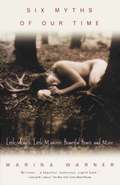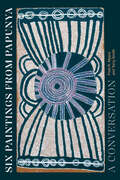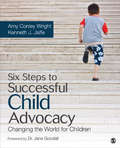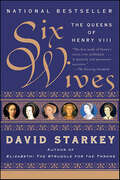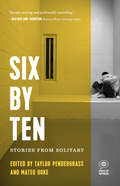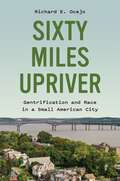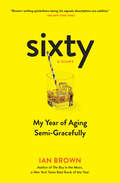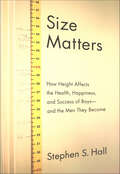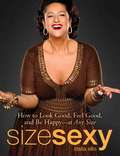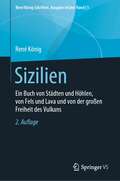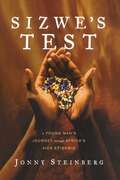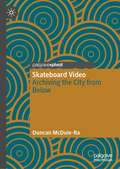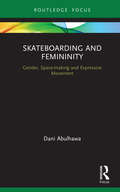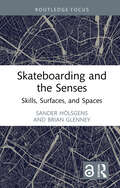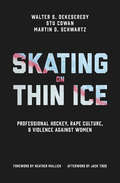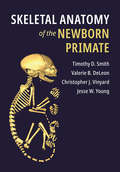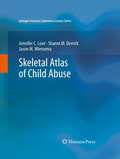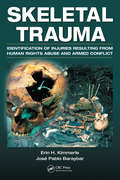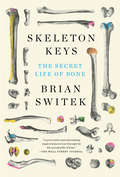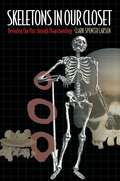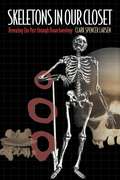- Table View
- List View
Six Myths of Our Time: Little Angels, Little Monsters, Beautiful Beasts, and More
by Marina WarnerIs Jurassic Park a work of covert misogynist propaganda? Does romanticizing childhood lead to abusing children? What secret correspondence links Mary Shelley's Frankenstein to video games and Shakespeare's Caliban to Hannibal Lecter? in what ways do our culture's most hallowed legends inform the current debates over single mothers, the men's movement, and animal rights? In these six dazzlingly intelligent and provocative essays, the distinguished English novelist and critic Marina Warner weaves classical mythology, pop culture, and today's headlines into a potent work of cultural criticism that is both unsettling and entertaining. Ranging from Medeato Thelma and Louise and from myths of cannibalism to the politics of rape, Six Myths of Our Time is at once a celebration of the enduring power of fable and a welcome antidote to its more virulent manifestations in our public life.
Six Paintings from Papunya: A Conversation
by Terry Smith Fred R. MyersIn the early 1970s at Papunya, a remote settlement in the Central Australian desert, a group of Indigenous artists decided to communicate the sacred power of their traditional knowledge to the wider worlds beyond their own. Their exceptional, innovative efforts led to an outburst of creative energy across the continent that gave rise to the contemporary Aboriginal art movement that continues to this day. In their new book, anthropologist Fred Myers and art critic Terry Smith discuss six Papunya paintings featured in a 2022 exhibition in New York. They draw on several discourses that have developed around First Nations art—notably anthropology, art history, and curating as practiced by Indigenous and non-Indigenous interpreters. Their focus on six key paintings enables unusually close and intense insight into the works’ content and extraordinary innovation. Six Paintings from Papunya also includes a reflection by Indigenous curator and scholar Stephen Gilchrist, who considers the nature and significance of this rare transcultural conversation.
Six Steps to Successful Child Advocacy: Changing the World for Children
by Amy Conley Wright Kenneth J. JaffeSix Steps to Successful Child Advocacy: Changing the World for Children (by Amy Conley Wright and Kenneth J. Jaffe) offers an interdisciplinary approach to child advocacy, nurturing key skills through a proven six-step process that has been used to train child advocates and create social change around the world. The approach is applicable for micro-advocacy for one child, mezzo-advocacy for a community or group of children, and macro-advocacy at a regional, national, or international level. This practical text offers skill-building activities and includes timely topics such as how to use social media for advocacy. Case studies of advocacy campaigns highlight applied approaches to advocacy across a range of issues, including child welfare, disability, early childhood, and education. Words of wisdom from noted child advocates from the U.S. and around the world, including a foreword from Dr. Jane Goodall, illustrate key concepts. Readers are guided through the process of developing a plan and tools for a real-life child advocacy campaign.
Six Wives: The Queens of Henry VIII
by David StarkeyThe dramatic, legendary story of Henry VIII, his six wives, and the England they ruled—told by one of the world’s preeminent historians of the Tudor era.“Extraordinary. . . . It is a tribute to Starkey’s narrative drive, his puckish wit, and sharp discrimination that it doesn’t seem a page too long. . . . With each queen, Starkey offers a vivid character study but also has fresh discoveries that subtly alter the picture he started out with.” —Sunday Times (London)No one in history had a more eventful career in matrimony than Henry VIII. His marriages were daring and tumultuous, and made instant legends of six very different women. In this remarkable study, David Starkey argues that the king was not a depraved philanderer but someone seeking happiness—and a son. Knowingly or not, he elevated a group of women to extraordinary heights and changed the way a nation was governed.Six Wives is a masterful work of history that intimately examines the rituals of diplomacy, marriage, pregnancy, and religion that were part of daily life for women at the Tudor Court. Weaving new facts and fresh interpretations into a spellbinding account of the emotional drama surrounding Henry’s six marriages, David Starkey reveals the central role that the queens played in determining policy. With an equally keen eye for romantic and political intrigue, he brilliantly recaptures the story of Henry’s wives and the England they ruled.“The best study of Henry’s wives ever published. . . . A masterly and persuasive narrative.” —The Evening Standard (London)“Eminently interesting. . . . A boon to fans of English royal history, full of murder and mayhem, but also of solid analysis of a maddeningly complicated era.” —Kirkus Reviews (starred review)
Six Years With The Texas Rangers, 1875-1881 [Definitive Yale Edition]
by James B. Gillett"Six Years With The Texas Rangers, 1875-1881" by James B. Gillett is a riveting firsthand account of life on the frontier, offering an authentic glimpse into the rugged and perilous existence of the Texas Rangers during one of the most turbulent periods in American history. This 1963 Yale University edition brings Gillett's captivating memoir to a new generation of readers, preserving the vivid details and dramatic narratives of his six years of service.James B. Gillett, a renowned figure in the history of the American West, recounts his experiences with the Texas Rangers with unflinching honesty and remarkable clarity. From his recruitment in 1875 to his departure in 1881, Gillett's narrative is filled with thrilling encounters, fierce battles, and the relentless pursuit of outlaws and renegades. His stories capture the essence of frontier justice and the indomitable spirit of the Rangers as they navigated the lawless and often dangerous landscape of post-Civil War Texas.The book offers a rich tapestry of historical events, personal anecdotes, and detailed descriptions of the people and places that defined Gillett's tenure with the Rangers. Readers will meet legendary figures like Captain Leander McNelly and John B. Jones, and witness the daring exploits that earned the Rangers their formidable reputation. Gillett's eloquent prose and keen observations bring to life the camaraderie, challenges, and triumphs of life in the Rangers, making this memoir an invaluable resource for anyone interested in the Old West."Six Years With The Texas Rangers, 1875-1881" is not just a chronicle of Gillett's adventures but also a poignant reflection on the broader social and political changes of the era. The 1963 Yale University edition enhances the original text with historical context and scholarly insights, making it an essential addition to the library of historians, enthusiasts of the American West, and anyone fascinated by the legacy of the Texas Rangers.James B. Gillett's memoir stands as a testament to the bravery and resilience of the Texas Rangers, offering a timeless narrative that continues to captivate and inspire readers.
Six by Ten: Stories from Solitary (Voice of Witness)
by Taylor Pendergrass and Mateo HokeThirteen personal accounts of solitary confinement’s devastating impact in the United States criminal justice system.Six by ten feet. That’s the average size of the cells in which tens of thousands of people incarcerated in the United States linger for weeks, months, and even decades in solitary confinement. With little stimulation and no meaningful human contact, these individuals struggle to preserve their identity, sanity, and even their lives. In thirteen intimate narratives, Six by Ten explores the mental, physical, and spiritual impacts of America’s widespread embrace of solitary confinement. Through stories from those subjected to solitary confinement, family members on the outside, and corrections officers, Six by Ten examines the darkest hidden corners of America’s mass incarceration culture and illustrates how solitary confinement inflicts lasting consequences on families and communities far beyond prison walls. Stories include those of Brian, who was shuttled from prison to prison across Illinois as part of an unofficial program that came to be known as “the circuit”; Heather, a mother fighting for the life of her son, Nikko, who was diagnosed as bipolar at a young age and sent to solitary as a teenager; and Sonya, a trans woman sent to solitary in a men’s jail in Texas, supposedly for her own protection.Praise for Six by Ten“A consistently eye-opening, urgent report on the use and misuse of prisoner isolation.” —Kirkus Reviews“Compels change by giving a voice to the voiceless . . . . The stories stop you in your tracks, but the appendices help move progress forward with simplicity, depth, and hope, beginning with ten things anyone can do that are impactful and accessible. The educational pieces of the book give apt background on the history and usage of solitary confinement, allowing even those examining the practice for the first time to have a firm grasp of the situation.” —Foreword Reviews“A deeply moving and profoundly unsettling wake up call for all citizens. The use of solitary confinement is deeply immoral and we must insist that it be banned in all of our nation’s prisons. Immediately.” —Heather Ann Thompson, Pulitzer Prize–winning author, Blood in the Water: The Attica Prison Uprising of 1971 and Its Legacy
Six in a Bed: The Future of Love - from Sex Dolls and Avatars to Polyamory
by Roanne van VoorstLove is the most important and intense experience of our life. It pushes us to elation, to heartbreak, to sing for joy and sob in disappointment. Connecting in this way to others is an essential quality of being human: without love, we don’t learn and develop properly as children and we don’t flourish as adults – in short, we’re starved of what we need. But love is on the verge of monumental change. Sex robots are already on the market, polyamory is gaining ground, drugs are being developed that can make you fall in love, and AI and robotics are set to revolutionize how we relate to each other. Debates about whether more than two people should be able legally to get married are heating up; at the same time, an increasing number of people have decided to stay single and who go by the name of sologamists. The futures anthropologist Roanne van Voorst spent three years researching love’s fluid landscape and immersing herself in today’s latest trends to gain insight into the human of tomorrow. She cultivated a virtual friendship, hired a rentable friend and an erotic masseuse, shared a bed with sex dolls and flirted with artificial intelligence. She dated and danced in a virtual world, spoke to polyamorists, sologamists, sex workers, pansexuals, asexuals, heterosexuals, homosexuals, men, women, and people who don’t accept the binary gender label. She wanted to know how changes to love are changing our species. This book is her brilliantly engaging answer.
Sixty Miles Upriver: Gentrification and Race in a Small American City
by Richard E. OcejoAn unvarnished portrait of gentrification in an underprivileged, majority-minority small cityNewburgh is a small postindustrial city of some twenty-eight thousand people located sixty miles north of New York City in the Hudson River Valley. Like many other similarly sized cities across America, it has been beset with poverty and crime after decades of decline, with few opportunities for its predominantly minority residents. Sixty Miles Upriver tells the story of how Newburgh started gentrifying, describing what happens when White creative professionals seek out racially diverse and working-class communities and revealing how gentrification is increasingly happening outside large city centers in places where it unfolds in new ways.As New York City&’s housing market becomes too expensive for even the middle class, many urbanites are bypassing the suburbs and moving to smaller cities like Newburgh, where housing is affordable and historic. Richard Ocejo takes readers into the lives of these newcomers, examining the different ways they navigate racial difference and inequality among Newburgh&’s much less privileged local residents, and showing how stakeholders in the city&’s revitalization reframe themselves and gentrification to cast the displacement they cause to minority groups in a positive light.An intimate exploration of the moral dilemma at the heart of gentrification, Sixty Miles Upriver explains how progressive White gentrifiers justify controversial urban changes as morally good, and how their actions carry profound and lasting consequences for vulnerable residents of color.
Sixty: My Year Of Aging Semi-gracefully
by Ian Brown“This is the thing, you see: I am on my way to being an old man. But at sixty, I am still the youngest of old men.” As acclaimed journalist and author Ian Brown’s sixtieth birthday loomed, every moment seemed to present a choice: Confront, or deny, the biological fact that the end was now closer than the beginning. Brown chose instead to notice every moment—to try to capture precisely what he was experiencing, without panicking. Sixty is the result: an uncensored, seriocomic report, a slalom of day-to-day dramas (as husband, father, brother, friend, and neighbor), inquisitive reporting, and acute insights from the line between middle-aged and soon-to-be-elderly.
Size Matters: How Height Affects the Health, Happiness, and Success of Boys—and the Men They Become
by Stephen S. HallAn award-winning journalist tackles the hot topic of male body image and shows how physical size during childhood affects our psychology, social status, relationships, and income as adults. With a mix of fresh research, incisive reportage, and bracing candor, Size Matters traces the surprising history of society&’s bias against shortness and reveals how short people can and do thrive in spite of this insidious bigotry. Drawing on his own childhood experiences (he was shorter than 99 percent of boys his age), Stephen Hall explains the evolution of the growth chart, the biology of childhood aggression, and the wrenching phenomenon of bullying. He explores the factors that determine why one child&’s small stature may lead to anguish while another short child develops an emotional resilience that will enrich his later life. Weaving together recent findings from the fields of animal behavior, psychology, and evolutionary biology, Hall assesses the role of physical size in mating success and argues that the alpha male may not be king of the mountain after all. Hall also pinpoints the social forces that create and cash in on our anxieties about size, from bulked-up superhero action figures to pharmaceutical companies selling growth hormone to increase a child&’s height -- at a cost of up to $40,000 a year. He introduces us to families who have agonized over whether to make that huge investment. He explains new research showing that a person&’s height as a teenager has lifelong psychological consequences. He even tracks down kids he bullied in elementary school and kids who bullied him in high school to show that these childhood encounters have lasting effects on our adult lives. Along the way, Hall builds a persuasive case against societal attitudes that make size (or any difference) matter and argues forcefully that being short has psychological, social, and biological advantages. Size Matters will raise the consciousness -- and the spirits -- of any short male and anyone who cares about him.
Size Sexy: How to Look Good, Feel Good, and Be Happy - At Any Size
by Stella Ellis"I like to say that my hourglass figure is more like an hour and a half!"--Stella, as quoted in O MagazineTo become a "muse" to Jean-Paul Gaultier, you have to be someone special, and Stella Ellis filled that role when she rocked the modeling world.
Sizilien: Ein Buch von Städten und Höhlen, von Fels und Lava und von der großen Freiheit des Vulkans (René König Schriften. Ausgabe letzter Hand #5)
by René KönigDie vorliegende Studie über Sizilien ist René Königs zugleich erlebnisintensivstes und literarischstes Werk: Ein Buch voller Eindrücke. Bilder und Visionen, in dem der Autor sich ganz persönlich und direkt ausspricht. Aus Reiseerfahrungen erwachsen und teilweise noch unterwegs entworfen, lässt König während der Zürcher Emigrationszeit vor seinem inneren Auge die Spontaneität der sizilianischen Natur und Kultur, aber auch die düstere Skepsis der Inselbewohner wieder aufleben. Als ihm selbst die Drohungen von Armut, Verfolgung und Krieg näher rücken, bewahrt er sich in der mediterranen Rückschau die Hoffnung auf ein Dasein in Freiheit. 1943 erstmals in Zürich erschienen, wurde das Buch bald nach dem Ende des Zeiten Weltkriegs auch in Deutschland veröffentlicht. René König hat ihm zeit seines Lebens eine besondere Zuneigung bewahrt, denn es stand am Anfang seiner Liebe zu Italien, das ihm zweite Heimat wurde.
Sizwe's Test: A Young Man's Journey Through Africa's AIDS Epidemic
by Jonny SteinbergAt the age of twenty-nine, Sizwe Magadla is among the most handsome, well-educated, and richest of the men in his poverty-stricken village. Dr. Hermann Reuter, a son of old South West African stock, wants to show the world that if you provide decent treatment, people will come and get it, no matter their circumstances. Sizwe and Hermann live at the epicenter of the greatest plague of our times, the African AIDS epidemic. In South Africa alone, nearly 6 million people in a population of 46 million are HIV-positive. Already, Sizwe has watched several neighbors grow ill and die, yet he himself has pushed AIDS to the margins of his life and associates it obliquely with other people's envy, with comeuppance, and with misfortune. When Hermann Reuter establishes an antiretroviral treatment program in Sizwe's district and Sizwe discovers that close family members have the virus, the antagonism between these two figures from very different worlds -- one afraid that people will turn their backs on medical care, the other fearful of the advent of a world in which respect for traditional ways has been lost and privacy has been obliterated -- mirrors a continent-wide battle against an epidemic that has corrupted souls as much as bodies. A heartbreaking tale of shame and pride, sex and death, and a continent's battle with its demons, Steinberg's searing account is a tour-de-force of literary journalism.
Skate Life: Re-Imagining White Masculinity
by Emily Chivers Yochim"Intellectually deft and lively to read,Skate Lifeis an important addition to the literature on youth cultures, contemporary masculinity, and the role of media in identity formation. " ---Janice A. Radway, Northwestern University, author of Reading the Romance: Women, Patriarchy, and Popular Literature. "With her elegant research design and sophisticated array of anthropological and media studies approaches, Emily Chivers Yochim has produced one of the best books about race, gender, and class that I have read in the last ten years. In a moment where celebratory studies of youth, youth subcultures, and their relationship to media abound, this book stands as a brilliantly argued analysis of the limitations of youth subcultures and their ambiguous relationship to mainstream commercial culture. " ---Ellen Seiter, University of Southern California. "Yochim has made a valuable contribution to media and cultural studies as well as youth and American studies by conducting this research and by coining the phrase 'corresponding cultures,' which conceptualizes the complex and dynamic processes skateboarders employ to negotiate their identities as part of both mainstream and counter-cultures. " ---JoEllen Fisherkeller, New York University. Skate Life examines how young male skateboarders use skate culture media in the production of their identities. Emily Chivers Yochim offers a comprehensive ethnographic analysis of an Ann Arbor, Michigan, skateboarding community, situating it within a larger historical examination of skateboarding's portrayal in mainstream media and a critique of mainstream, niche, and locally produced media texts (such as, for example,Jackass,Viva La Bam, and Dogtown and Z-Boys). The book uses these elements to argue that adolescent boys can both critique dominant norms of masculinity and maintain the power that white heterosexual masculinity offers. Additionally, Yochim uses these analyses to introduce the notion of "corresponding cultures," conceptualizing the ways in which media audiences both argue with and incorporate mediated images into their own ideas about identity. In a strong combination of anthropological and media studies approaches,Skate Life asks important questions of the literature on youth and provides new ways of assessing how young people create their identities. Emily Chivers Yochim is Assistant Professor in the Department of Communication Arts, Allegheny College.
Skateboard Video: Archiving the City from Below
by Duncan McDuie-RaThis book is about skateboard video and experimental ways of thinking about cities. It makes a provocative argument to consider skate video as an archive of the city from below. Here ‘below’ has a dual meaning. First, below refers to an unofficial archive, a subaltern history of urban space. Second, below refers to the angle from which skateboarders and filmers gaze upon, capture, and consume the city—from the ground up. Since taking to the streets in the early 1980s, skateboarding has been captured on film, video tape and digital memory cards, edited into consumable forms and circulated around the world. Videos are objects amenable to ethnographic analysis while also archiving exercises in urban ethnography by their creators. I advocate for taking skate video seriously as a (fragile) archive of the urban backstage, collective memory across time and space, creative urban practice, urban encounters (people-to-people and people-to-object/s), and the globalization of a subculture at once delinquent and magnificent.
Skateboarding LA: Inside Professional Street Skateboarding (Alternative Criminology #10)
by Gregory J. SnyderInside the complex and misunderstood world of professional street skateboardingOn a sunny Sunday in Los Angeles, a crew of skaters and videographers watch as one of them attempts to land a “heel flip” over a fire hydrant on a sidewalk in front of the Biltmore Hotel. A staff member of the hotel demands they leave and picks up his phone to call the police.Not only does the skater land the trick, but he does so quickly, and spares everyone the unwanted stress of having to deal with the cops. This is not an uncommon occurrence in skateboarding, which is illegal in most American cities and this interaction is just part of the process of being a professional street skater. This is just one of Gregory Snyder’s experiences from eight years inside the world of professional street skateboarding: a highly refined, athletic and aesthetic pursuit, from which a large number of people profit. Skateboarding LA details the history of skateboarding, describes basic and complex tricks, tours some of LA's most famous spots, and provides an enthusiastic appreciation of this dangerous and creative practice. Particularly concerned with public spaces, Snyder shows that skateboarding offers cities much more than petty vandalism and exaggerated claims of destruction. Rather, skateboarding draws highly talented young people from around the globe to skateboarding cities, building a diverse and wide-reaching community of skateboarders, filmmakers, photographers, writers, and entrepreneurs. Snyder also argues that as stewards of public plazas and parks, skateboarders deter homeless encampments and drug dealers. In one stunning case, skateboarders transformed the West LA Courthouse, with Nike’s assistance, into a skateable public space.Through interviews with current and former professional skateboarders, Snyder vividly expresses their passion, dedication and creativity. Especially in relation to the city's architectural features—ledges, banks, gaps, stairs and handrails—they are constantly re-imagining and repurposing these urban spaces in order to perform their ever-increasingly difficult tricks. For anyone interested in this dynamic and daunting activity, Skateboarding LA is an amazing ride.
Skateboarding and Femininity: Gender, Space-making and Expressive Movement (Routledge Advances in Theatre & Performance Studies)
by Dani AbulhawaSkateboarding and Femininity explores and highlights the value of femininity both within skateboarding and wider culture. This book examines skateboarding’s relationship to gender politics through a consideration of the personal politics connected to individual skateboarders, the social-spatial arenas in which skateboarding takes place, and by understanding the performance of tricks and symbolic movements as part of gender-based power dynamics. Dani Abulhawa anaylses the discursive frameworks connected to skateboarding philanthropic projects and how these operate through gendered tropes. Through the author’s work with skateboarding charity SkatePal, this book offers an alternative way of recognising the value of skateboarding philanthropy projects, proposing a move toward a more open and explorative somatic practice perspective.
Skateboarding and the Senses: Skills, Surfaces, and Spaces (Routledge Focus on Sport, Culture and Society)
by Brian Glenney Sander HölsgensThis book presents a new perspective on skateboarding, centred on the senses, skill acquisition, embodiment, and the concept of "city craft".Skateboarding and the Senses traces how skaters use their skilled bodies to bring vitality to contested spaces. Building on sensory anthropology, the book draws connections between the diverse ways skaters move and their boundless drive for social action – from rebellious interventionism to a critical engagement with sportification and the Olympics. Coalescing around skateboarding’s pedagogy of enskilment, the book examines what to make of the skater’s way of sensing the city, of their bruised heels and scabbed elbows and of their sensory attunement to their friends and foes. Grounded in historical, anthropological, and phenomenological theories of body and space, it examines how skaters acquire somatic knowledge and socio-emotional resilience through their sonic and vibratory experience of the city streets. This sensory anthropology of skateboarding reveals new insights into its long arc of subculture, lifestyle, and sport.This is essential reading for anybody with an interest in the sociology, culture or history of sport, urban geographies, sensory studies, or social and cultural anthropology.
Skating on Thin Ice: Professional Hockey, Rape Culture, and Violence against Women
by Martin D. Schwartz Walter DeKeseredy Stu CowanSkating on Thin Ice exposes the culture of toxic masculinity in professional hockey and suggests how sport and society can change the narrative on sexual assault and violence. Why is it that professional sports, and notably hockey, remain a bastion for rape culture and violence against women? What are the conditions that allow a culture of toxic masculinity to persist despite awakenings elsewhere in society? What is the path forward, and how do we make officials, coaches, and athletes accountable? Drawing on decades of award-winning sociological research and sports journalism, Walter S. DeKeseredy, Martin D. Schwartz, and veteran sportswriter Stu Cowan find answers to these questions in Skating on Thin Ice. The book examines the abusive, misogynistic, racist, and homophobic behaviors found in professional hockey and explains the larger societal forces that perpetuate and legitimate these harms. Confirming a recent federal government inquiry into Hockey Canada’s handling of sexual assault allegations, the book reveals that young men enter the NHL and other revenue-generating hockey leagues already trained and primed to treat women as objects – and often to commit violent acts against them. Rooted in the authors’ work in the sports world as well as their work with activists and governments, Skating on Thin Ice doesn’t just highlight the problem of hockey and rape culture, it also provides collaborative solutions for fixing it.
Skeletal Anatomy of the Newborn Primate
by Timothy D. Smith Valerie B. DeLeon Christopher J. Vinyard Jesse W. YoungAlthough much is known about the anatomy of adult primates, particularly chimpanzees, the same cannot be said for the anatomy of young primates, especially non-hominoid primates such as lemurs and marmosets. This is the first book dedicated to newborn skeletal and dental anatomy and how it varies across primate species, which is important for interpreting adult primate skeletal form, as well as for comprehending primate and human evolution. Structured according to anatomical regions, the book includes hundreds of detailed anatomical illustrations, a color atlas illustrating entire skeletons in representative taxa, and boxes at the end of each chapter providing further detail on key aspects covered in the main text. Whilst the book is primarily a guide to comparative anatomy, it also highlights the links between development and behavior. An indispensable resource for students and researchers in the fields of biological anthropology, anatomy, primatology, growth and development, dental biology, and veterinary medicine.
Skeletal Atlas of Child Abuse
by Jennifer C. Love Jason M. Wiersema Sharon M. DerrickThis illustrated guide to the role of the forensic anthropologist in investigating child abuse is an essential resource in one of the most contentious areas of forensic pathology. Not only does it supply a review of the literature in this field, but it illustrates the material with photographs from real cases investigated by the Harris County Institute of Forensic Sciences, which serves a population of four million people. Broken down into body regions and skeletal elements for ease of reference, the atlas facilitates the vital work performed by forensic anthropologists, who bring to the autopsy table a store of specialist knowledge that can turn a case. Despite the frequency of child fatalities (in America, 2.3per 100,000) attributed to physical abuse, merely recognizing the offense is a major forensic challenge. The tell-tale signatures of non-accidental injury can be very subtle, making it difficult to differentiate between accidental and non-accidental injury. Yet successful adjudication of a child abuse case often rests on the correct interpretation of skeletal injury. In this volume the authors guide the reader through published data regarding the mechanics and interpretation of injuries,including the agencies they indicate. The material includes discussion of the limitations faced in interpreting some injuries, where making a judgment on cause is tricky. In addition, a chapter on natural diseases affecting the bones provides a good overview of several conditions that are often invoked as 'mimics' of child abuse. Finally, this publication evinces the value of collaboration between the pathologist and the anthropologist.
Skeletal Trauma: Identification of Injuries Resulting from Human Rights Abuse and Armed Conflict
by Erin H. Kimmerle Jose Pablo BaraybarWritten to assist in large-scale investigations of human rights violations, this seminal work describes the mechanisms of injuries, synthesizes variations in wounding patterns, and constructs an epidemiological framework for collecting, analyzing, and interpreting physical evidence for use at trial. It presents protocols for systemic data collection and methods for differential wound diagnosis. Contributions evaluate blasting injuries, blunt force trauma, skeletal evidence of torture, sharp force trauma, and gunfire injuries. Illustrated with more than 600 photographs, each chapter discusses wounding mechanisms, wound pathophysiology, relevant legal examples, and contributed case studies.
Skeleton Keys: The Secret Life of Bone
by Brian Switek“A provocative and entertaining magical mineral tour through the life and afterlife of bone.” —Wall Street Journal Our bones have many stories to tell, if you know how to listen. Bone is a marvel, an adaptable and resilient building material developed over 500 million years of evolutionary history. It gives our bodies their shapes and the ability to move. It grows and changes with us, an undeniable document of who we are and how we lived. Arguably, no other part of the human anatomy has such rich scientific and cultural significance, both brimming with life and a potent symbol of death. Brian Switek is a charming and enthusiastic osteological raconteur. In this natural and cultural history of bone, he explains where our skeletons came from, what they do inside us, and what others can learn about us when these wondrous assemblies of mineral and protein are all we've left behind. Bone is as embedded in our culture as it is in our bodies. Our species has made instruments and jewelry from bone, treated the dead like collectors' items, put our faith in skull bumps as guides to human behavior, and arranged skeletons into macabre tributes to the afterlife. Switek makes a compelling case for getting better acquainted with our skeletons, in all their surprising roles. Bridging the worlds of paleontology, anthropology, medicine, and forensics, Skeleton Keys illuminates the complex life of bones inside our bodies and out.
Skeletons in Our Closet: Revealing Our Past through Bioarchaeology
by Clark Spencer LarsenThe dead tell no tales. Or do they? In this fascinating book, Clark Spencer Larsen shows that the dead can speak to us--about their lives, and ours--through the remarkable insights of bioarchaeology, which reconstructs the lives and lifestyles of past peoples based on the study of skeletal remains. The human skeleton is an amazing storehouse of information. It records the circumstances of our growth and development as reflected in factors such as disease, stress, diet, nutrition, climate, activity, and injury. Bioarchaeologists, by combining the methods of forensic science and archaeology, along with the resources of many other disciplines (including chemistry, geology, physics, and biology), "read" the information stored in bones to understand what life was really like for our human ancestors. They are unearthing some surprises. For instance, the shift from hunting and gathering to agriculture approximately 10,000 years ago has commonly been seen as a major advancement in the course of human evolution. <P><P> However, as Larsen provocatively shows, this change may not have been so positive. Compared to their hunter-gatherer ancestors, many early farmers suffered more disease, had to work harder, and endured a poorer quality of life due to poorer diets and more marginal living conditions. Moreover, the past 10,000 years have seen dramatic changes in the human physiognomy as a result of alterations in our diet and lifestyle. Some modern health problems, including obesity and chronic disease, may also have their roots in these earlier changes. Drawing on vivid accounts from his own experiences as a bioarchaeologist, Larsen guides us through some of the key developments in recent human evolution, including the adoption of agriculture, the arrival of Europeans in the Americas and the biological consequences of this contact, and the settlement of the American West in the eighteenth and nineteenth centuries. Written in a lively and engaging manner, this book is for anyone interested in what the dead have to tell us about the living.
Skeletons in our Closet: Revealing Our Past through Bioarchaeology
by Clark Spencer LarsenThe dead tell no tales. Or do they? In this fascinating book, Clark Spencer Larsen shows that the dead can speak to us--about their lives, and ours--through the remarkable insights of bioarchaeology, which reconstructs the lives and lifestyles of past peoples based on the study of skeletal remains. The human skeleton is an amazing storehouse of information. It records the circumstances of our growth and development as reflected in factors such as disease, stress, diet, nutrition, climate, activity, and injury. Bioarchaeologists, by combining the methods of forensic science and archaeology, along with the resources of many other disciplines (including chemistry, geology, physics, and biology), "read" the information stored in bones to understand what life was really like for our human ancestors. They are unearthing some surprises. For instance, the shift from hunting and gathering to agriculture approximately 10,000 years ago has commonly been seen as a major advancement in the course of human evolution. However, as Larsen provocatively shows, this change may not have been so positive. Compared to their hunter-gatherer ancestors, many early farmers suffered more disease, had to work harder, and endured a poorer quality of life due to poorer diets and more marginal living conditions. Moreover, the past 10,000 years have seen dramatic changes in the human physiognomy as a result of alterations in our diet and lifestyle. Some modern health problems, including obesity and chronic disease, may also have their roots in these earlier changes. Drawing on vivid accounts from his own experiences as a bioarchaeologist, Larsen guides us through some of the key developments in recent human evolution, including the adoption of agriculture, the arrival of Europeans in the Americas and the biological consequences of this contact, and the settlement of the American West in the eighteenth and nineteenth centuries. Written in a lively and engaging manner, this book is for anyone interested in what the dead have to tell us about the living.
